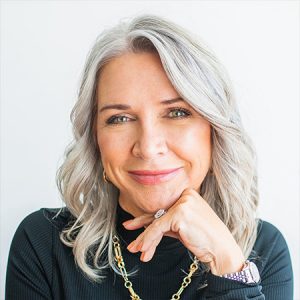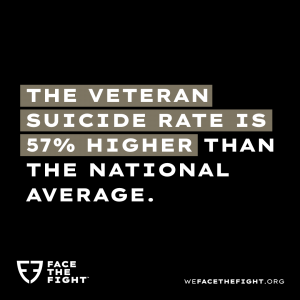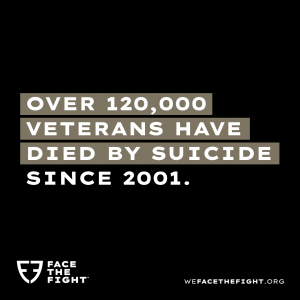May is Mental Health Awareness Month. Over the past few years, mental health has become a bigger issue in the overall discussion of military force readiness. In fact, a recent study by the DOD showed that active-duty personnel suffer mental health diagnoses at a rate 11.7%, roughly a third of which suffer multiple diagnoses, representing a 40% rise in diagnoses over the period between 2019 and 2023.
We’ve reached out to Dr. Jude Black, one of the program participants in IVMF’s CEOcircle that also happens to be a longtime mental health and wellness professional. Her current venture is E-Therapy Café®, a place where people can seek out mental health options online. We’ve asked Doctor Jude to help us out and answer some basic questions about mental health, and what we can do to improve our own and help those around us.
 First, Is this rise in diagnoses a crisis, or a breakthrough in Detective and awareness?
First, Is this rise in diagnoses a crisis, or a breakthrough in Detective and awareness?
Doctor Jude: It’s both. The uptick in diagnoses doesn’t mean our force is suddenly more fragile—it means we’re finally calling things what they are. For too long, mental health struggles in the military were swept under the rug, labeled as weakness or “just part of the job.” And let’s be honest, acknowledging those struggles often came with real consequences: missed promotions, limited assignments, paused deployments. Speaking up could derail a career.
I do not believe that what we’re seeing now is a breakdown in resilience—I believe it’s a breakthrough in recognition. We’re finally naming the “invisible wounds” caused by chronic stress, repeated deployments, isolation, and, yes, toxic command climates. We’re getting better at identifying the wear and tear on both the service member and the family holding it all together behind the scenes. And while it’s sobering to see the numbers rise, it’s also a sign that stigma is starting to crack.
We’re finally making space for the truth and naming the pain is the first step toward healing it.
Now imagine if we treated mental health the same way we treat readiness. Imagine if every service member was equipped with real tools, resources, and coping skills before they hit the wall—just like we do for physical training. We’d not only preserve careers—we’d strengthen the entire force.
What should military personnel, veterans, spouses, or others in the IVMF community take away from this?
Doctor Jude: Here’s what I want every military-connected human to hear loud and clear: You are not broken. You are human.
Mental health challenges don’t mean you’ve failed—they mean you’ve carried weight most people can’t even comprehend. These diagnoses don’t define you—they help us create a roadmap to get you back to yourself. Remember, we each control the narrative that we tell ourselves and we must edit frequently.
So yes, take away an increased awareness, but also take away permission. Permission to pause. To ask for help. To finally ditch the lie that you have to hold it all together. Real strength isn’t about white-knuckling your way through—it’s about knowing when to raise your hand and say, “I need a minute.” That’s not weakness, that is grit and strength.
For those feeling stressed, but undiagnosed, what can they do today to manage their mental health?
 Doctor Jude: When stress creeps in, and it will, I always encourage people to start with what I call “Dr. Jude’s Basic 4”: sleep, nutrition, action, and connection. These aren’t rocket science, but they’re foundational. When they’re off, everything else starts to unravel.
Doctor Jude: When stress creeps in, and it will, I always encourage people to start with what I call “Dr. Jude’s Basic 4”: sleep, nutrition, action, and connection. These aren’t rocket science, but they’re foundational. When they’re off, everything else starts to unravel.
Sleep is where your system resets—physically and emotionally. Without it, even the smallest stressors feel overwhelming. Set boundaries around rest like your life depends on it, because it does.
Nutrition is how we fuel everything—our energy, our mood, our focus. I love pasta, truly I do, but when I’m living off carbs and comfort food, I feel the crash. It’s not about perfection or restriction, it’s about balance. Food is chemistry, and your brain runs on what you give it.
Action doesn’t have to mean hitting the gym. It just means moving your body in ways that release stress. Walk, stretch, breathe, dance, do whatever gets you back into yourself.
And finally, connection. I talk a lot about Candle Lighters and Candle Blowers. Candle Lighters are your people, the ones who remind you who you are and help you shine brighter. Candle Blowers drain your energy and dim your light. Right now, protect your peace. Choose connection that fuels you, not depletes you. If you take a minute, I bet you that you can absolutely identify who your Candle Lighters and Candle Blowers are! Choose wisely.
How can we support someone in our life who may be, or seem to be, struggling?
Doctor Jude: First things first—don’t ask “How are you?” unless you’re actually prepared to stop and hear the answer. That kind of drive-by empathy doesn’t help. It is dismissive and teaches people their truth isn’t welcome. If you’re going to ask, be willing to stay.
Support doesn’t require the perfect words or a clinical degree. What it requires is presence.
- Show up.
- Hold space.
- Be consistent.
People don’t need fixing—they need someone who won’t flinch when things get heavy.
Instead of the usual check-in, try:
- “What’s weighing on you today?”
- “Need to vent, talk, or just sit in silence?”
- “No pressure to talk—but if something’s heavy, I’m here to carry some of it with you.”
That’s how we break the stigma. That’s how we help people feel seen, heard, and safe enough to stop hiding.
What resources should the IVMF community know about?
 There are a ton of resources out there—and while that’s a gift, it can also feel overwhelming. One of the last things we want to do when life is heavy is start consulting with Dr. Google and Nurse TikTok to figure it out.
There are a ton of resources out there—and while that’s a gift, it can also feel overwhelming. One of the last things we want to do when life is heavy is start consulting with Dr. Google and Nurse TikTok to figure it out.
So, here’s a streamlined list of trusted places to start:
National and Online Support:
- Veterans Crisis Line – Dial 988, then press 1 (or text 838255).
- Military OneSource – Confidential support for military families.
- Cohen Veterans Network – Therapy for post-9/11 veterans and families. They do take Tricare.
- Give An Hour – Free therapy from licensed mental health providers.
- VA Mental Health – For those enrolled in VA healthcare.
- E-Therapy Café® – Online, trauma-informed care from real licensed therapists (shameless plug and I also know my team shows up to meet you exactly where you are without judgment!).
- Find many more resources at the bottom of this piece
Local and Community-Based Resources:
- Vet Centers – Often overlooked, these provide confidential counseling and support outside the VA.
- Faith communities, gyms, CrossFit boxes, veteran orgs, and peer support groups – Don’t underestimate the healing power of shared space and shared stories.
- Mental health care happens in offices and Zoom rooms—but it also happens over coffee, in quiet walks, and in circles of people who get it.
Do you have any final thoughts on participating in Mental Health Awareness Month?
Doctor Jude: Mental Health Awareness Month isn’t about hashtags, ribbons, or performative posts—it’s about truth-telling. It’s about giving ourselves and each other permission to stop pretending, to speak honestly about the weight we carry, and to normalize conversations that have been pushed into the shadows for far too long.
If you want to participate, start by being real. Share your story.
Reach out to someone who’s gone quiet.
Talk about therapy like you talk about the gym—necessary, healthy, and worth investing in.
Check in on the strong ones, the silent ones, the ones who laugh the loudest, but flinch when the room gets quiet. They often need it the most.
This month is for you—the one still holding it together by sheer will. The one showing up tired, anxious, or unsure but still choosing to care, to lead, to love. You don’t need to have it all figured out, you just need to be honest about where you are. There’s strength in that.
When we own our stuff, we give others permission to own theirs. That’s how the stigma starts to crack and how healing spreads. It spreads in everyday moments of honesty, humility, and humanity. I would encourage all of us to take advantage of Mental Health Awareness Month and make it less about “awareness” and more about action. Show up. Speak up. Lean in. Let someone see the real you. That’s where the work begins.
IVMF Mental Health Efforts & Resources
 Military servicemember and veteran mental health is an important subject at the D’Aniello Institute for Veterans and Military Families (IVMF). Our current efforts include working with Syracuse University’s Center for Health Behavior Research & Innovation (CHB) to study how, when, and why servicemembers and veterans access mental health care, and how to better meet them where they are so they seek mental health care when it can do the most good.
Military servicemember and veteran mental health is an important subject at the D’Aniello Institute for Veterans and Military Families (IVMF). Our current efforts include working with Syracuse University’s Center for Health Behavior Research & Innovation (CHB) to study how, when, and why servicemembers and veterans access mental health care, and how to better meet them where they are so they seek mental health care when it can do the most good.
- IVMF is also partnering with Face the Fight to combat the far-too-high veteran suicide rate. Face the Fight (FTF) is a coalition founded by USAA to bring together corporations, foundations, nonprofits, and veteran-focused organizations to raise awareness and support for veteran suicide prevention. IVMF joined the coalition in early 2024.
- IVMF also has ongoing evaluation projects with Warriors & Quiet Waters and the George W. Bush Institute’s Veteran Wellness Alliance to help them improve their programs and put their efforts where they’re most effective.
- IVMF’s research department has published several studies related to mental health. Just filter by “health & wellness” to access studies on a variety of mental health subjects.
- We also have some videos that cover a broad spectrum of information and resources worth viewing here and here.
Additional Mental Health Resources
Substance Use Treatment
VA Resources: https://www.va.gov/health-care/health-needs-conditions/substance-use-problems/
AddictionResource – Veterans and Substance Abuse: The Many Sides of the Problem – Addiction Resource was founded in 2014 to provide a community for those recovering from addiction and to help patients find the highest quality care for a successful recovery. Their goal is to provide resources to help patients and their loved ones so that they may stay on the road to recovery, and can successfully overcome addiction for life.
PTSD Treatment
PTSD: National Center for PTSD: https://www.ptsd.va.gov/
Suicide Prevention: From VA Newsletter
- Crisis conversation handout: https://acrobat.adobe.com/id/urn:aaid:sc:VA6C2:7b6a9317-622b-434c-8389-239115e18eaf
- VA S.A.V.E. Training: https://www.mentalhealth.va.gov/suicide_prevention/docs/VA_SAVE_Training.pdf
- If you’re a Veteran in crisis or concerned about one, contact the Veterans Crisis Line to receive 24/7, confidential support. You don’t have to be enrolled in VA benefits or health care to connect. To reach responders, Dial 988 then Press 1, chat online at VeteransCrisisLine.net/Chat, or text 838255.
If you’ve done anything to harm yourself or need immediate support to prevent a suicide attempt, call 911 or go to your nearest emergency provider without delay. Cost should never be a concern at these critical moments, and the emergent suicide care benefit under the COMPACT Act has you covered. Whether at VA or non-VA facilities, enrolled in VA health care or not, VA will provide, pay for or reimburse eligible individuals for expenses related to this lifesaving care, including:
- Transportation to the emergency department.
- Up to 30 days of inpatient care.
- Up to 90 days of outpatient care.
- Coverage of all related prescriptions.
- Referrals for additional services tailored to your individual needs.
During a crisis, time is critical. Be prepared by knowing the name and location of your closest emergency department before a crisis occurs.
Veterans Crisis Line
- Veteran Crisis & Suicide Line – 988 and press 1 (pressing 1 brings you to the Veteran Crisis Line responders 24/7)
- The Veterans Crisis Line is also available by chat (VeteransCrisisLine.net/Chat) and text (838255)
The Veterans Crisis Line’s 800 number is partnered with SAMHSA’s Lifeline network and is, therefore, a Continental United States (CONUS)-based toll-free number that remains active. As such, some international calls may incur a charge, depending upon the caller’s location and network provider. Nonetheless, a Veteran overseas may contact the Veterans Crisis Line via the chat modality at VeteransCrisisLine.net/Chat. If the Veteran prefers a phone call, they can request this within the chat venue. A Veterans Crisis Line responder will call them at the number they provide at no charge to the Veteran.
Veteran Crisis Line for Active Duty
- For active-duty personnel (VeteransCrisisLine.net/ActiveDuty.aspx), the Veterans Crisis Line is available:
- In Europe, call 00800 1273 8255 or DSN 118.
- In Korea, call 080-855-5118 or DSN 118.
- In Afghanistan, call 00 1 800 273 8255 or DSN 111.
- In the Philippines, call #MYVA or 02-8550-3888 and press 7.
Calling from Overseas
- EUCOM: tel:1-844-702-5495 (off base) or DSN 988 (on base)
- AFRICOM: tel:1-888-482-6054 (off base) or DSN 988 (on base)
- PACOM: tel:1-844-702-5493 (off base) or DSN 988 (on base)
- CENTCOM: tel:1-855-422-7719 (off base) or DSN 988 (on base)
- SOUTHCOM: tel:1-866-989-9599 (off base) or DSN 988 (on base)
*Each of these numbers is assigned to a different U.S. Department of Defense Area of Responsibility. If you have trouble reaching the Veterans Crisis Line with the assigned number for the region you are calling from, try one of the other numbers.
